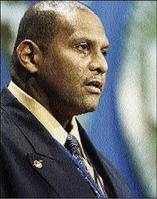Jamaica willing to re-engage on LNG
Published: Wednesday | July 15, 2009

Conrad Enill, Trinidad and Tobago's minister of energy. - File
Trinidad and Tobago says it can rekindle serious talks for the supply of LNG to Jamaica once it concludes discussions with Caracas later this month on the specifics for their exploitation of a new and rich natural gas field in the seas between Trinidad and Venezuela.
Senior Venezuelan officials are due in Port-of-Spain shortly for the talks which, according to Conrad Enill, the Trinidad and Tobago energy minister, should set a clear framework for the way forward.
"Shortly thereafter, we should be in a position to talk about some specific time frame (for discussions with Jamaica)," Enill told Wednesday Business.
Any agreement now between Trinidad and Tobago and Venezuela would be unlikely to yield natural gas for at least two years - or longer - providing Jamaica with perhaps enough time to build out storage and regasfication facilities.
At same time, though, Jamaica is seeking alternative, short-term sources, including Venezuela and Middle Eastern countries, in the event that it should be ready before Venezuela is in a position to supply LNG (liquefied natural gas).
"The minister (of energy, James Robertson) made it clear in parliament that we probably will not be able to get LNG going until 2012, and the preferred source would be from Trinidad," said Dr Raymond Wright, consultant at Petroleum Corporation of Jamaica (PCJ), the agency that oversees the Government's energy interests.
"There is also a source from Venezuela, but in the interim, provided that Trinidad does not deliver by that time, we have other sources, such as Qatar," he said.
Jamaica is also believed to have had energy-related talks with Kuwait, which sent a delegation to Kingston last week to hammer out a bilateral cooperation agreement.
The Cabinet, however, is yet to give its stamp of approval to that pact, so there has been no public announcement on what it contains.
Jamaica initially looked to Trinidad and Tobago for LNG in the late 1990s, when the Patterson administration wanted to convert major industries from expensive oil to gas. The use of LNG was seen as particularly critical to the longer-term viability of the island's alumina refineries.
Squabble over prices
The countries squabbled over Trinidad's pricing of LNG, but by 2004 the then Jamaican Prime Minister P.J. Patterson and his Trinidadian counterpart, Patrick Manning, signed an agreement for Port-of-Spain to supply 1.1 million tonnes of LNG a year, starting in 2009.
A US$1-billion plan to double the size of Jamalco alumina refinery in Hayes, Clarendon, was predicated on that agreement. But not long after the Trinidadians pulled out, saying that they did not have the LNG to sell because of existing contracts and a delay in reaching an deal with Venezuela on the development of the Loran/ Manatee field.
The planned Jamalco expansion collapsed.
Manning, however, placed the supply of LNG to Jamaica back on the agenda, saying that he intended to make it a "matter of priority" for his administration to help revive Jamaica's alumina sector, as most of plants have been shuttered by the global recession.
Manning raised the issue in the context of using his country's energy-based resources to help pull Trinidad and Tobago's Caribbean Community (CARICOM) partners out of their current crises.
But Enill seemed to suggest that any deal with Jamaica would depend on what happens with the Loran/Manatee field, with its estimated 10 trillion cubic feet of gas, which Port-of-Spain and Caracas agreed is owned 75 per cent in favour of Venezuela and 25 per cent for Trinidad and Tobago.
"Our thinking on the matter, especially as it relates to the cross border fields, would be sorted out some time by the end of this month," the energy minister said.
The former administration, prior to leaving office in 2007, had considered using specially adapted LNG vessels, moored perhaps at Old Harbour, as the LNG storage and liquefaction facility.
Officials had insisted that it was not only technically feasible but would be cheaper and quicker than constructing a shore-side facility. Similar issues have been raised recently by the current administration, but the position has not been fully or clearly articulated.
How to proceed

Wright
In fact, Wright suggested that the matter of how to proceed was still under discussion.
"The real question now is, when do you put in the infrastructure to be able to bring the LNG to Jamaica," he said. "How long will it take, how many months, how many years? ... There probably will be a supply arrangement prior to a long-term stable supply from Trinidad, and that arrangement could come from Qatar."
business@gleanerjm.com





















